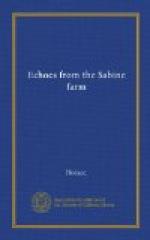What’s writ
below
I’d have
you know
Nor falsehood nor romance is;
It’s solemn
truth,
So grant the youth
The boon he seeks, dear Francis.
Eugene Field.
It is perhaps unnecessary to add that, however flimsy the pretext upon which the request for a copy was made, it never failed of its object if it brought with it Field’s endorsement. Among many pleasant utterances on this subject Field has said that but for the writer the Horatian verses would not have been given to the world—and this has been taken to mean more than was intended, and much unearned praise has been bestowed. But, in allusion to the original issue of the Odes, Field added, “in this charming guise,” which places quite another construction upon the matter.
It may be that the enthusiasm displayed not only pleased Field, and incited him and his brother Roswell to perform that which, otherwise, might have been indefinitely deferred, but there is no question but that they intended to publish the Horatian odes at some time or another. Field was greatly delighted with the reception of this work, and I once heard him say it would outlive all his other books. He came naturally by his love of the classics. His father was a splendid scholar who obliged his sons to correspond with him in Latin. Field’s favorite ode was the Bandusian Spring, the paraphrasing of which in the styles of the various writers of different periods gave him genuine joy and is perhaps the choice bit of the collection. The Echoes from the Sabine Farm was the most ambitious work Field had attempted up to the time of its issue. He was not at all sure that the public for whom he wrote, what following he then felt was his own, would accept his efforts in this direction with any sort of acclaim. Unquestionably, Field, at all times, believed in himself and in his power ultimately to make a name, as every man must who achieves success, but he was as far from believing that the public would accept him as an interpreter of Horatian odes as was Edward Fitzgerald with respect to Omar Khayyam. In short, he looked upon his work in the original publication of Echoes from the Sabine Farm as a labor of love—an effort from which some reputation might come, but certainly no monetary remuneration. It was because he so regarded it that he permitted the work to be first issued under the bolstering influence of a patron. It was, so he thought, an excellent opportunity to show his friends and acquaintances that his Pegasus was capable of soaring to classic heights, and he little dreamed that the paraphrasing of the Odes of Horace over which “Rose and I have been fooling” would be required for a popular edition. With the announcement of the Scribner edition of The Sabine Echoes came also the intelligence of Field’s death.
I have found people who were somewhat puzzled as to the exact intentions of the Fields with respect to these translations and paraphrases. However, there can be no chance for mistake even to the veriest embryonic reader of Horace, if he will but remember that, while some of these transcriptions are indeed very faithful reproductions or adaptations of the original, others again are to be accepted as the very riot of burlesque verse-making.




